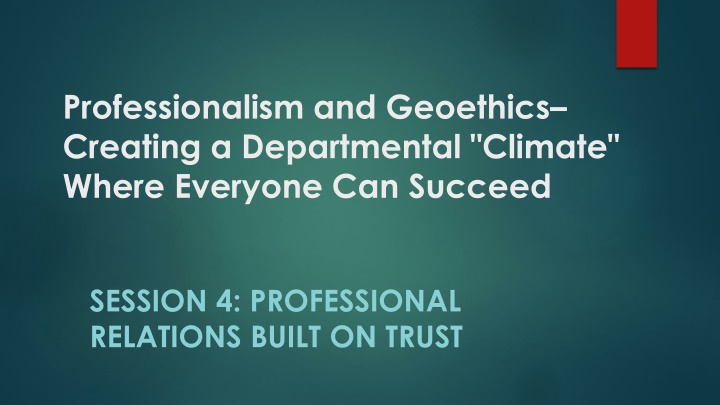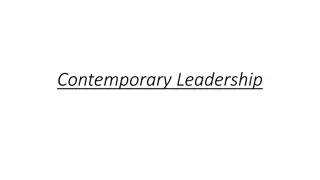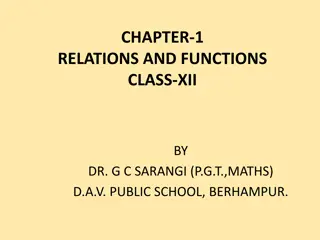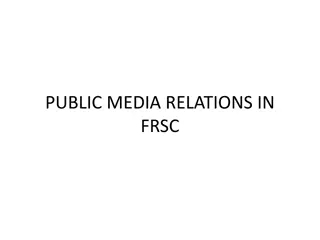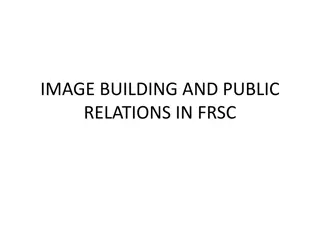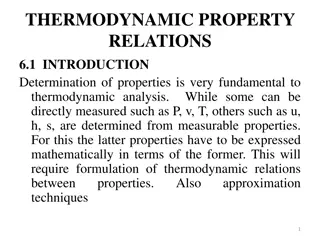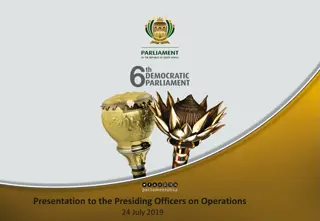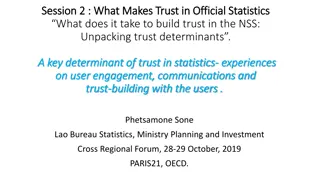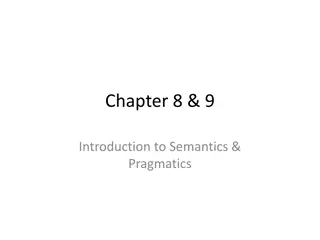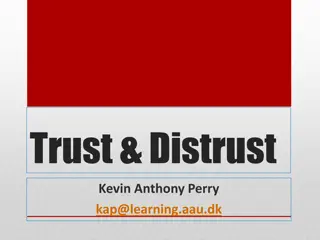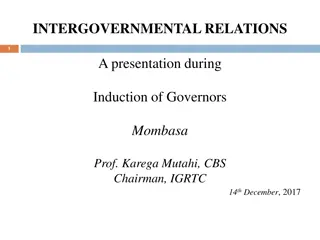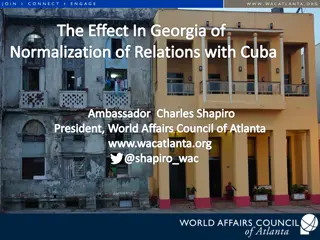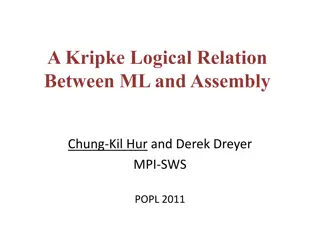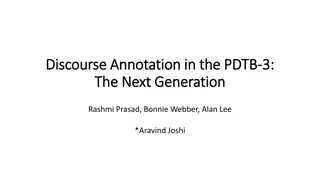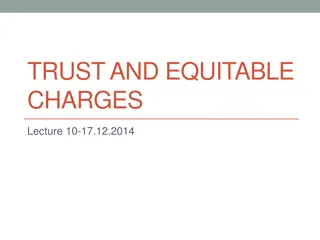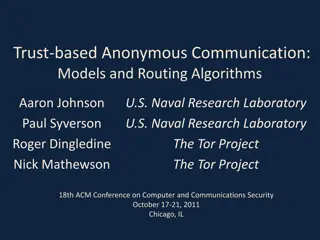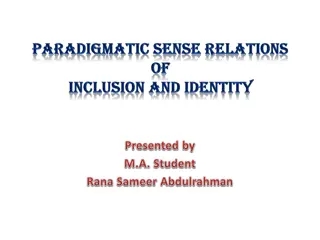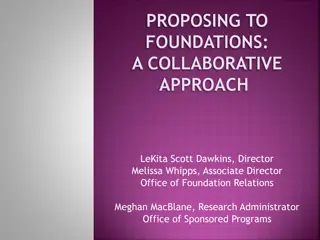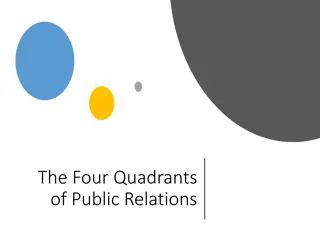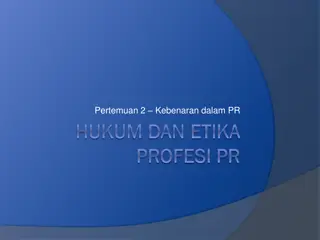Building Trust and Professional Relations in Geoethics
This session focuses on fostering professional relationships built on trust in a departmental setting to ensure success for all individuals. It covers various aspects like responsible research conduct, mentoring, collaborations, and handling conflicts of interest. Emphasizing the importance of research integrity, the session touches upon responsible data management, addressing research misconduct, and the roles of mentors and advisors in guiding students effectively.
Download Presentation

Please find below an Image/Link to download the presentation.
The content on the website is provided AS IS for your information and personal use only. It may not be sold, licensed, or shared on other websites without obtaining consent from the author.If you encounter any issues during the download, it is possible that the publisher has removed the file from their server.
You are allowed to download the files provided on this website for personal or commercial use, subject to the condition that they are used lawfully. All files are the property of their respective owners.
The content on the website is provided AS IS for your information and personal use only. It may not be sold, licensed, or shared on other websites without obtaining consent from the author.
E N D
Presentation Transcript
Professionalism and Geoethics Creating a Departmental "Climate" Where Everyone Can Succeed SESSION 4: PROFESSIONAL RELATIONS BUILT ON TRUST
Overview Day-to-day interactions built on trust things to reflect upon while you get to work Responsible conduct of research (where is this covered in the curriculum or elsewhere in the department?). Mentoring, asking for/writing letters of recommendation, Writing reviews (journal, proposal, performance), Collaborations, publication (authorship, credit), data policies, Lab/field/workplace safety, Appropriate behavior at meetings, Conflict of interest. Professional relations in service to society: contractor-client, advisor for public policy, serving as expert witness.
Responsible Conduct of Research Where is this introduced in your degree programs? Who has responsibility? To what degree are you prepared to deal with issues of scientific misconduct should they arise?
Responsible Conduct of Research Treatment of Data and Data Management Mistakes and Negligence Research Misconduct Response to Violation, whistleblowing Laboratory Safety Sharing Results Authorship-Credit Peer Review Publication Conflicts of Interest Intellectual Property Competing Interests, commitments, values
Research Misconduct Necessity for self-policing The details of how research is conducted are often known only to those actually working on a project Obligations to act There is a considerable range of opinions about how to respond to perceived misconduct . anunmistakable obligation to act.' Questions about research It is a responsibility of all scientists to find the best and most appropriate means to address concerns about the conduct of science.
Mentoring A mentor: Plays a more expansive role in the mentee's development. Provides wisdom, empathy, respect, knowledge, and support Is a guide within the scientific discipline Supports professional development Facilitates networking Explores career possibilities together An advisor: Guides students on academic progress through their program. Clarify requirements and procedures Check in on progress Assess status Discuss plans
Strategies for Effective Mentoring Make yourself available Foster community Team meetings, one-on-one meetings Journal Clubs Social Outings Be Attentive Encourage participation in the broader research community Attending meetings, visiting facilities, attending webinars Be Understanding Mario Pita et al, CUR Quarterly, Spring 2013
Letters of Recommendation Asking for letters Why you are asking this reference; provide context background information; provide CV, resume, transcripts Writing Letters Decide whether you can write a good letter for the applicant. It is OK to say no Request as much information as possible before you begin writing Do some research. Set aside ample time Be specific. Avoid clich descriptors and platitudes Organize the letter chronologically or thematically Be honest. Be original. Be genuine. Follow Through.
What is NOT in the letter: Personal attributes: e.g. whether or not he is a parent, married, his sexual orientation; or has a dog, or rides horses, etc. How well people like him in the department/college/institution/field How surprising his accomplishments are (his admin load is noted as a burden without reference to whether or not it impacted his productivity) Equivocation, weak wording, damning with faint praise; pretty good v. excellent Doubt-raisers: e.g. the record is good considering his [health, other job, personal situation] A quick good-bye: we all tend to write longer letters for men than for women Gender differences in recommendation letters for postdoctoral fellowships in geoscience Kuheli Dutt, Danielle, L. Pfaff, Ariel F. Bernstein, Joseph S. Dillard and Caryn J. Block, 2016, Nature Geoscience, DOI:10.1038/ngeo2819. See related commentary at Recommendation Letters Reflect Gender Bias Maggie Kuo, Science, October 3, 2016.
Publication Ethics Authorship priority, credit for publication Editor-Author A Troubled Tradition It's time to rebuild trust among authors, editors and peer reviewers by David Resnik, American Scientist, 2011 Volume 99, Number 1 Responsibilities of Editors and Reviewers a compilation of methods and scenarios to promote group discussion and reflection from the Online Ethics Center for Engineering and Science. Write reviews in the same manner you would like to receive them critical, but helpful, with references ..
AVOID CONFLICT! Communicate early and often! Have a clear understanding of expectations (of work effort, research outcomes ..) Know who has access to data and Permissions or conditions of publication..... See On the Cutting Edge contracts of faculty-student research collaborations.
Data Management Data provide the factual basis for scientific work The integrity of research depends on integrity in all aspects of data management, including the collection, use, and sharing of data. Integrity of the data is a shared responsibility All researchers have an interest in, and responsibility for, protecting the integrity of the research record. Quality of data collection depends on thoughtful planning. Adequate preparation for data collection helps to ensure that resources are not wasted and that significant results can be obtained.
Ethical Challenges in a Digital World Who controls information? Is there (should there be) an expectation of making information universal accessible? Who has right to use information? How to cite or indicate credit for information that s in the ether ? Who can use the information, and under what circumstances? Students must have clear understanding with advisors about data policies!
Safety In the lab In the field At the workplace How well are you informed, trained in policies, procedures? Who has responsibility?
Contractor Client Relations Professionalism in relations between contractors and clients may be dictated to some extent by licensure and certification requirements, although these requirements may vary according to national or state jurisdictions. Practitioners need to be aware of issues related to Competence Confidentiality Negligence Accurate representation of abilities,knowledge and expertise, and Reporting standards regarding uncertainty.
Geoscience Canada has produced Competency Profile for Professional Geoscientists at Entry to Practice and defines competence as "...the ability to perform a practice task with a specified level of proficiency." Professionalism 1.6.1 Comply with relevant legislation, regulations and statutory reporting requirements. 1.6.2 Practice within the bounds of one's expertise and limitations. 1.6.3 Maintain awareness of best practices and guidelines. 1.6.4 Seek advice or assistance where necessary. 1.6.5 Act with flexibility in dealing with new and changing situations. 1.6.6 Treat others with respect and fairness. 1.6.7 Apply basic conflict resolution strategies. 1.6.8 Share geoscience information to assist the learning of others. 1.6.9 Work in a multidisciplinary team environment. 1.6.10 Represent the profession in a responsible manner. 1.6.11 Recognize the impact of geoscience practice on clients, society and the natural environment
Geoscience Canada has produced Competency Profile for Professional Geoscientists at Entry to Practice and defines competence as "...the ability to perform a practice task with a specified level of proficiency 1.8 Ethics 1.8.1 Comply with relevant codes of ethics. 1.8.2 Recognize obligations and responsibilities to society, to clients and to employers. 1.8.3 Practice in a manner that is non-prejudicial. 1.8.4 Respect confidentiality of information. 1.8.5 Recognize potential, perceived and real conflicts of interest. 1.8.6 Act with concern for the natural environment. 1.8.7 Identify and address health and safety concerns encountered in practice. 1.8.8 Accept accountability for decisions and actions.
Expert Witness The Role of Expert Witness The witness is qualified as an expert by knowledge, skill, experience, training or education; Such knowledge will assist the court or jury to understand the evidence and decide disputed facts. That is, the knowledge is relevant to the matter under dispute. Serves as trial witness, advisor to court Mediates settlement discussions Facilitates comprehension of the evidence Avoid COI; Impeachment of evidence (credibility).
Activity 4: Use the ethical decision-making flow chart to assess and determine your recommended course of action for one of the 4 scenarios presented on the workshop webpage. What would YOU do?
